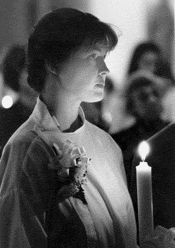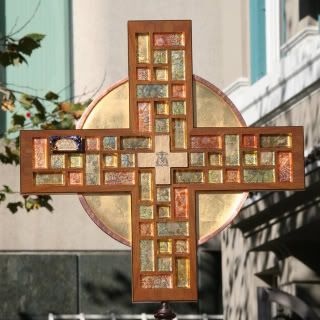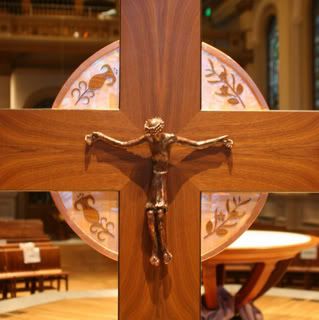From the Sacramentary Supplement, published by Catholic Book Publishing, Co., New York, 1994, p. 31.
- It is appropriate that the oil of the sick, the oil of catechumesn, and the holy chrism, which are blessed by the bishop during the Chrism Mass, be presented to and received by the local parish community.
- The reception of the holy oils may take place at the Mass of the Lord’s Supper on Holy Thursday or on another suitable day after the celebration of the Chrism Mass.
- The oils should be reserved in a suitable repository in the sanctuary or near the baptismal font.
- The oils, in suitable vessels, are carried in the procession of the gifts, before the bread and wine, by members of the assembly.
- The oils are received by the priest and are then placed on a suitable prepared table in the sanctuary or in the repository where they will be reserved.
- As each of the oils is presented, the following or other words may be used to explain the significance of the particular oil.
- The people's response may be sung.
Download the following diocesan Rite for Receiving the Holy Oils (in English and Spanish) as a Word document here.---
RITE FOR RECEIVING THE HOLY OILS
For use at the Evening Mass of the Lord’s Supper
on Holy Thursday in the Diocese of San José
revised 3/2006
The following are needed:
- the vessels containing the holy oils
- a table for placement of the holy oils with a burning candle upon this table
The order of ministers and representatives in the procession may be:
- incense bearer
- acolytes bearing lighted candles
- presenters bearing the vessels of the holy oils
- gift bearers with bread and wine
LITURGY OF THE EUCHARIST
1. Procession of Gifts
Those who presented the oils for blessing at the cathedral carry the vessels in procession with the gift bearers. Arriving at the front of the assembly, they stand where they can be seen by all. A song or instrumental may accompany the procession.
2. Reception of the Oils
The presider, facing the people, gives an instruction concerning the blessing and use of holy oils in these, or similar, words.
Priest:
Several days ago, united with the priests and faithful of the Diocese of San José, Bishop McGrath consecrated the holy Chrism and blessed the oils for use in the anointing of the sick and in preparation of catechumens for Baptism. Tonight we receive these holy oils for use in the celebration of the Church’s sacraments during the coming year.
As each oil is presented, the cantor (in simple, solemn chant) or another minister (in recitation) makes the accompanying proclamations which follow. The vessel containing the oil is held high by each presenter.
Cantor:
Behold the oil of the sick, blessed by our Bishop Patrick, and sent to us for the anointing of all who suffer illness.
People:
Blessed be God forever! or Thanks be to God!
Cantor:
Behold the oil of the catechumens, blessed by our Bishop Patrick, and sent to us for the anointing of our catechumens in preparation for their baptism at the Easter Vigil and throughout the coming year.
People:
Blessed be God forever! or Thanks be to God!
Cantor:
Behold the sacred chrism, oil mixed with sweet perfume and consecrated by our Bishop Patrick, and sent to us for the anointing of the baptized who are to be sealed with the Holy Spirit.
People:
Blessed be God forever! or Thanks be to God!
The oils are then placed into the ambry or on a table with a burning candle. The Mass continues with the preparation of the gifts at the altar.
---
RITO PARA RECIBIR LOS SANTOS ÓLEOS
Para usarlo en la Misa de la Cena del Señor
el Jueves Santo en la Diócesis de San José
revised 3/2006
Para el Rito, se necesita lo siguiente:
- Los Santos Óleos
- Una mesa para poner los Santos Óleos y una vela encendida sobre la mesa
El orden posible de la procesión siguiente:
- El incienso
- Acólitos con velas encendidas
- Las personas que llevan los aceites
- Las personas que llevan las ofrendas del pan y el vino
LITURGIA DE LA EUCARISTIA
1. Procesión de las Ofrendas
Las personas que presentaron los santos óleos en la catedral para ser bendecidos, los llevarán ahora en la procesión de las ofrendas. Y al llegar frente a la asamblea se quedarán en un lugar donde todos puedan verlos. Durante la procesión se canta un himno de alabanza.
2. Recepción de los oleos
El sacerdote que preside explica el origen y usos de los santos óleos con estas palabras u otras similares.
Hace varios días, el obispo McGrath unido a los sacerdotes y fieles de la Diócesis de San José, consagró el sagrado crisma y bendijo los aceites que se usan en la unción de los enfermos y en la preparación de los catecúmenos para el bautismo. Esta noche recibimos estos óleos para usarlos en la celebración de los sacramentos de la Iglesia durante el próximo año.Al presentar cada aceite, el cantor (con un canto sencillo y solemne) o un ministro (recitado) hará la siguiente proclamación. Mientras, la persona que lleva el aceite correspondiente lo mantiene en alto.
Miren el aceite de los enfermos, bendecido por nuestro obispo Patrick que nos lo ha enviado para ungir a todos los que sufren enfermedades.
Todos:
¡Bendito seas por siempre, Señor! o ¡Demos gracias a Dios!
Cantor:
Miren el aceite de los catecúmenos, bendecido por nuestro obispo Patrick que nos lo ha enviado para ungir a los catecúmenos en su preparación para el bautismo en la Vigilia Pascual durante el próximo año.
Todos:
¡Bendito seas por siempre, Señor! o ¡Demos gracias a Dios!
Cantor:
Miren el sagrado crisma, aceite mezclado con perfume y consagrado por nuestro obispo Patrick que nos lo ha enviado para ungir a los bautizados que van a ser sellados con el Espíritu Santo.
Todos:
¡Bendito seas por siempre, Señor! o ¡Demos gracias a Dios!Los que llevan los óleos los colocan en una mesa con una vela encendida. La misa continúa con la preparación de las ofrendas.
 On Saturday, March 31, 2007, from 9:00a to 3:00p, Saint Mary's School in Los Gatos will be having an Electronic Waste Collection Event.
On Saturday, March 31, 2007, from 9:00a to 3:00p, Saint Mary's School in Los Gatos will be having an Electronic Waste Collection Event.

 Click here to get
Click here to get 
